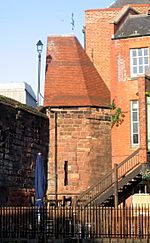Thimbleby's Tower facts for kids
Quick facts for kids Thimbleby's Tower |
|
|---|---|

Thimbleby's Tower
|
|
| OS grid reference | SJ 408 662 |
| Built | 13th century (probable) |
|
Listed Building – Grade I
|
|
| Designated | 28 July 1955 |
| Reference no. | 1376164 |
| Lua error in Module:Location_map at line 420: attempt to index field 'wikibase' (a nil value). | |
Thimbleby's Tower, which used to be called Wolf's Tower, is an old building that is part of the city walls in Chester, Cheshire, England. You can find it on the eastern side of the walls, between Eastgate and Newgate. This tower is very important, so it's officially protected as a Grade I listed building.
A Look Back in Time
Thimbleby's Tower was probably built a long, long time ago, in the 1200s. It was partly destroyed during a big fight called the Civil War. This happened during the siege of Chester between 1644 and 1646.
Later, from 1702 to 1708, all of Chester's city walls were changed. They were turned into a raised path where people could walk. It's very likely that the tower was also changed during this time.
The tower got some repairs in 1879. Then, in 1994 and 1995, it was changed again. These changes were done for the Chester City Council by an architect named Peter de Figuerdo.
How the Tower Looks
Thimbleby's Tower is built from red sandstone blocks that are laid in rows. It has a shape that is half of an octagon. It looks like the outer part of a round tower, but without its top floors.
Inside the Tower
The bottom room of the tower has three narrow, unglazed windows. These are called "loops." At the level of the walkway, you can still see the starting points of what used to be a curved ceiling, or "vault."
Recent Changes
During the changes made in 1994 and 1995, some parts of the tower were updated. The stone wall that separated the walkway from the tower was replaced. It was changed to a screen made of oak wood and clear plastic.
A new, steeply sloped roof was also added to the top of the tower. This roof is covered with tiles. Experts say that this new roof "hides its former defensive features and purpose." This means it makes the tower look less like a fort and more like a regular building.

